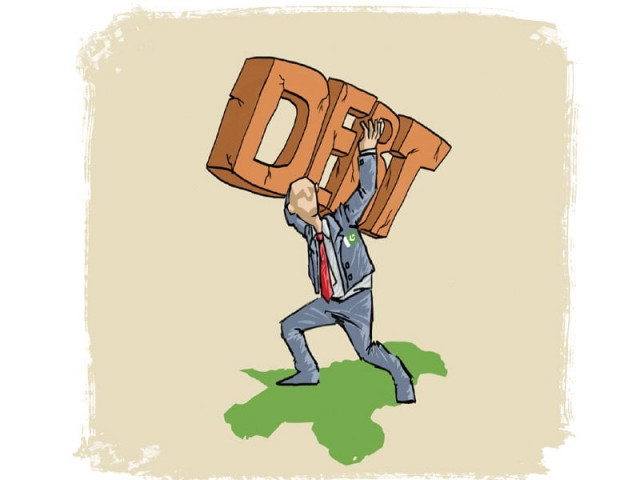PTI govt places debt office under bureaucracy
Move aimed at ensuring proper scrutiny of the files and recommendations

ILLUSTRATION: JAMAL KHURSHID
The office that otherwise should have been at the centre to manage the Rs33 trillion public debt has remained a rolling stone between the fiscal and monetary authorities of the country.
“The files of the Debt Policy Coordination Office required to be submitted to the finance secretary, shall be routed through the additional finance secretary, external finance, with immediate effect and until further orders,” according to a ministry’s notification issued on March 18.
The order is in contravention to the Fiscal Responsibility and Debt Limitation Act, 2005. Its Section 12(1) read: “The Debt Policy Coordination Office shall work under the direct supervision of the Minister and consist of three directors of whom two directors shall be from the private sector and one of the directors shall be designated as Director General.”
The purpose of placing the debt office under the additional secretary is said to be ensuring proper scrutiny of the files and recommendations of the debt office about contracting new loans and issuing sovereign guarantees.
However, the function performed by the additional secretary (external finance) is just one of the six key roles assigned to the debt office that may deprive the government of valuable input about other areas.
The Ministry of Finance spokesperson’s response was awaited till the filing of the report.
The decision to place the debt office under the bureaucracy is also against the recommendations given by the International Monetary Fund and the World Bank. The World Bank is in the process of finalising a policy loan aimed at strengthening various institutions, including the debt office.
The director general of the debt office is hired from the private sector and traditionally the finance ministry has picked a competent person for the post. A recent technical mission of the IMF had advised enhancing the powers of the debt office, including its human resource.
The mishandling of the debt office by the Ministry of Finance is not an isolated incident. In the past, the State Bank of Pakistan too had influenced the debt office by managing to overrule its recommendations on the issue of borrowing from commercial banks.
That had provided an opportunity to banks to offer loans to the federal government at higher
interest rates. The central bank remained quiet and did not enforce its interest rate corridor in true spirit to force the banks to behave properly.
The central bank accepted the banks’ excess liquidity at rates that were in breach of its interest rate corridor that allowed the banks to make money and at the same time exploit the federal government.
The federal government has set aside Rs2.9 trillion for debt servicing in the current fiscal year, which it has projected to increase to Rs3.3 trillion next year or 42% of next year’s expected federal budget.
Sources told The Express Tribune that in sudden decision taken about ten months ago, the Ministry of Finance had started borrowing from commercial banks more than its requirements. That at one point in time had created serious issues between the top dwellers of the Q Block.
The Ministry of Finance’s action had strengthened the monopoly of banks that started dictating their terms to the government.
As per the law, the debt office should remain central to debt management in the country as it is mandated by the Pakistan Fiscal Responsibility and Debt Limitation Act to undertake coordination within all designated entities.
The latest decision could undermine the working of the debt office.
The debt office is responsible for preparing a debt reduction path to achieve the principles of sound fiscal and debt management; monitor and evaluate external and domestic borrowing strategies and provide policy advice on an appropriate mix of external borrowing from all sources, according to the law.
Debt management at the federal level is scattered among various institutions and entities, most of them within the Ministry of Finance with little coordination among them, according to a paper that the World Bank wrote as part of its lending programme to Pakistan.
The federal debt management operation includes the budget wing, external finance wing, SBP, Central Directorate of National Savings (CDNS), Economic Affairs Division, and Debt Policy Coordination Office (DPCO).
Of the six units involved, no single entity has overall responsibility and necessary authority to achieve the debt management objectives and the strategic goals, according to the World Bank.



















COMMENTS
Comments are moderated and generally will be posted if they are on-topic and not abusive.
For more information, please see our Comments FAQ